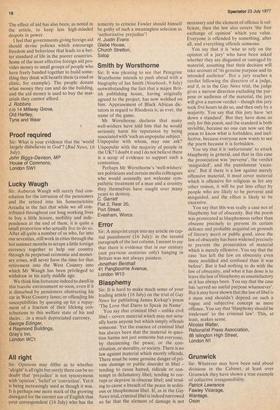Blasphemy
Sir: It is hard to make much sense of your leading article (16 July) on the trial of Gay News for publishing James Kirkup's poem 'The Love that Dares to Speak its Name'.
You say that criminal libel — unlike civil libel — covers material which may not actually harm anyone but which simply offends someone. Yet the essence of criminal libel has always been that the material in question harms not just someone but everyone, by threatening the peace, or the constitution, or morality, or society. There is no law against material which merely offends. There must be some genuine danger of.privale damage or public disorder in libel — tending to cause hatred, ridicule or contempt in defamatory libel; tending to corrupt or deprave in obscene libel; and tending to cause a breach of the peace in seditious or blasphemous libel. If, as in the Gay News trial, criminal libel is indeed narrowed so far that the element of damage is not
necessary and the element of offence is sufficient, then the law also covers 'the free exchange of opinion' which you value. Everyone is offended by something, after all, and everything offends someone.
You say that it is 'wise to rely on the opinion of a jury' who have been asked whether they are disgusted or outraged by material, assuming that their decision will take account of 'its genuine purpose and its intended audience'. But a jury reaches a verdict following the direction of a judge, and if, as in the Gay News trial, the judge gives a narrow direction excluding the purpose or audience of the material, the jury will give a narrow verdict — though this jury took five hours to do so, and then only by a majority. You say that this jury have 'set down a standard'. But they have done so only for this poem, and the standard is both invisible, because no one can now see the poem to know what is forbidden, and ineffective, because everyone now wants to see the poem because it is forbidden.
You say that it is 'unfortunate' to attack blasphemy in general, and that in this case the prosecution was 'perverse', the verdict 'misguided', and the punishment 'excessive'. But if there is a law against merely offensive material, it must cover material which is offensive for religious as for any other reason, it will be put into effect by people who are likely to be perverse and misguided, and the effect is likely to be excessive.
You say that this was really a case not of blasphemy but of obscenity. But the poem was prosecuted as blasphemous rather than obscene precisely to prevent its certain defence and probable acquittal on grounds of literary merit or public good, since the law of obscenity has been widened precisely to prevent the prosecution of material which is merely offensive. You say that the case 'has left the law on obscenity even more muddled and confused than it was before'. But it had nothing to do with the law of obscenity, and what it has done is to leave the law of blasphemy as unsatisfactory as it has always been. You say that the case has 'served no useful purpose whatsoever'. But it may have shown that the law of libel is a mess and shouldn't depend on such a vague and subjective concept as mere offence. You say that 'blasphemy should be irrelevant' to the criminal law'. This, at least, makes sense.
Nicolas Walter, Rationalist Press Association, 88 Islington High Street, London Ni






































 Previous page
Previous page